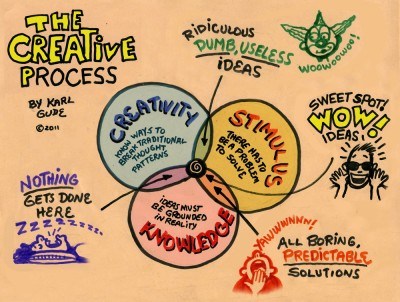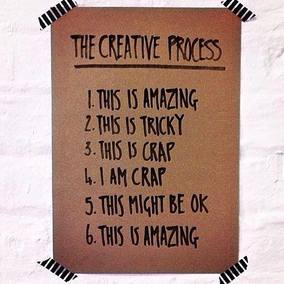For this blog, I am focusing on the assessment of the performing arts, as with my Circus program we often present a show as our culminating event, and as a licenced Teacher I will need to be able to assess my students for this activity.
There are conflicting points of view on Arts Assessment in the research:
There are conflicting points of view on Arts Assessment in the research:
- Performing Arts as Product:
- Performing Arts as Process:
As discussed in Arts with the Brain in Mind, there are various and at times competing stakeholders invested in Arts Assessment. The student/teacher/parent dynamic, who are invested in the actual learnings and at time unmeasurable qualities that the arts encourage and develop (compassion, courage, morality, etc), and the administrators/policy makers, who may be focused on test scores and summative outcomes in order to acquire (and thus distribute) funding.
Status quo and old school summative testing philosophies are problematic when applied to the arts, although a product-based assessment stance attempts to do so. Formative and process assessment techniques reflect the realities of the artistic process- that an engaged attempt to “do art” is messy, full of self doubt, and struggle. It is in our reflection on these struggles that the learning happens.
Assessing students on their process is more realistic and reflective of true learning, yet is still problematic in that it tends to be subjective from the teacher’s perspective. It is also challenging to know when the student’s efforts are ‘good enough’ to denote a Pass, or insufficient to reflect a Fail. It is true that some students may be marginalized by a summative marking system, and thus disengaged from the learning process.
The BC Curriculum has moved away from emphasizing summative assessment in all areas. The Arts Education Curriculum Learning Standards and Content focus primarily on process and experience, not product. Learning Standards such as “Explore identity, place, culture, and belonging through arts experiences” and “ Reflect on creative processes and make connections to other experiences” are stated, along with Content such as “personal and collective responsibility associated with creating, experiencing, and performing in a safe learning environment”. These encourage teachers to focus on process, not product.
Status quo and old school summative testing philosophies are problematic when applied to the arts, although a product-based assessment stance attempts to do so. Formative and process assessment techniques reflect the realities of the artistic process- that an engaged attempt to “do art” is messy, full of self doubt, and struggle. It is in our reflection on these struggles that the learning happens.
Assessing students on their process is more realistic and reflective of true learning, yet is still problematic in that it tends to be subjective from the teacher’s perspective. It is also challenging to know when the student’s efforts are ‘good enough’ to denote a Pass, or insufficient to reflect a Fail. It is true that some students may be marginalized by a summative marking system, and thus disengaged from the learning process.
The BC Curriculum has moved away from emphasizing summative assessment in all areas. The Arts Education Curriculum Learning Standards and Content focus primarily on process and experience, not product. Learning Standards such as “Explore identity, place, culture, and belonging through arts experiences” and “ Reflect on creative processes and make connections to other experiences” are stated, along with Content such as “personal and collective responsibility associated with creating, experiencing, and performing in a safe learning environment”. These encourage teachers to focus on process, not product.
I feel that a formative assessment of the Arts is a way to include marginalized students in alternative ways of knowing and expressing themselves, and a way to encourage success and belonging in students who may be on the fringe of the status quo system. I am a teacher who is concerned with supporting each student on their learning journey, not just the ones who are already benefiting from the traditional educational system; Formative arts assessment speaks to me on a personal level as a way to reach and encourage those students. My personal values of creating an inclusive classroom that is concerned with social justice and anti-oppressive practice, and including an arts program in my classroom that focuses on personal growth and learning is one way to do this.
Followup:
I was tasked with developing a rubric for our performing arts Myth based drama production this semester. Using my knowledge of arts growth and assessment, my research in formative and summative assessment systems, and input from the class on what is important, I created the following rubric which includes both performance assessment and process reflection.
Sources:
http://www.thedramateacher.com/how-to-keep-performance-assessment-in-drama-objective/
Jensen, Eric. (2001) Arts with the Brain in Mind. Association for Supervision and Curriculum Development. USA.
https://curriculum.gov.bc.ca/curriculum/arts-education/4
Followup:
I was tasked with developing a rubric for our performing arts Myth based drama production this semester. Using my knowledge of arts growth and assessment, my research in formative and summative assessment systems, and input from the class on what is important, I created the following rubric which includes both performance assessment and process reflection.
Sources:
http://www.thedramateacher.com/how-to-keep-performance-assessment-in-drama-objective/
Jensen, Eric. (2001) Arts with the Brain in Mind. Association for Supervision and Curriculum Development. USA.
https://curriculum.gov.bc.ca/curriculum/arts-education/4



 RSS Feed
RSS Feed
